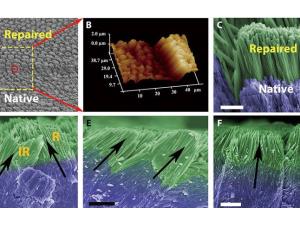



Date:03/09/19
 Chinese researchers have developed a substance intended to "induce" the teeth to self-repair. A discovery that they believe could mark a new era in the treatment of cavities.
Chinese researchers have developed a substance intended to "induce" the teeth to self-repair. A discovery that they believe could mark a new era in the treatment of cavities.
No more fillings? A team of researchers at Zhejiang University in China has developed a gel that can repair tooth enamel, according to a study published Friday (August 30th) in Science Advances.
This innovative product contains calcium and phosphate, building elements of natural enamel and supposed to "induce" the teeth to self-repair. After a series of conclusive tests, the researchers assured that their discovery could mark a new era in the treatment of cavities.
The gel was tested on human teeth damaged by acid. They were placed in an environment imitating the mouth. 48 hours later, researchers found the growth of a new tooth enamel.
"This is probably due to the fact that at the time of natural tooth development, the enamel that forms is covered with a disordered layer of calcium and phosphate particles – as in the gel – which promotes its growth", explains one of the researchers, quoted by New Scientist.
The new enamel did not exceed three microns thick, which is 400 times less than the thickness of the natural layer. The researchers say that by applying the gel several times, it would be possible to obtain the necessary thickness.
A gel that "encourages" teeth to self-repair developed in China
 Chinese researchers have developed a substance intended to "induce" the teeth to self-repair. A discovery that they believe could mark a new era in the treatment of cavities.
Chinese researchers have developed a substance intended to "induce" the teeth to self-repair. A discovery that they believe could mark a new era in the treatment of cavities.No more fillings? A team of researchers at Zhejiang University in China has developed a gel that can repair tooth enamel, according to a study published Friday (August 30th) in Science Advances.
This innovative product contains calcium and phosphate, building elements of natural enamel and supposed to "induce" the teeth to self-repair. After a series of conclusive tests, the researchers assured that their discovery could mark a new era in the treatment of cavities.
The gel was tested on human teeth damaged by acid. They were placed in an environment imitating the mouth. 48 hours later, researchers found the growth of a new tooth enamel.
"This is probably due to the fact that at the time of natural tooth development, the enamel that forms is covered with a disordered layer of calcium and phosphate particles – as in the gel – which promotes its growth", explains one of the researchers, quoted by New Scientist.
The new enamel did not exceed three microns thick, which is 400 times less than the thickness of the natural layer. The researchers say that by applying the gel several times, it would be possible to obtain the necessary thickness.
Views: 434
©ictnews.az. All rights reserved.Similar news
- Azerbaijani project to monitor disease via mobile phones
- Innovative educational system to be improved under presidential decree
- NTRC prolongs license of two TV and radio organizations for 6 years
- Azerbaijan establishes e-registry for medicines
- Azerbaijani museum introduces e-guide
- Nar Mobile opens “Nar Dunyasi” sales and service center in Siyazan city
- International conference on custom electronic services held in Baku
- OIC secretary general to attend COMSTECH meeting in Baku
- Azerbaijan develops earthquake warning system
- New law to regulate transition to digital broadcasting in Azerbaijan
- Azerbaijani State Social Protection Fund introduces electronic digital signature
- Intellectual traffic management system in Baku to be commissioned in December
- Tax Ministry of Azerbaijan started receiving video-addresses
- World Bank recommends Azerbaijan to speed up e-service introduction in real estate
- Azerbaijan to shift to electronic registration of real estate





















